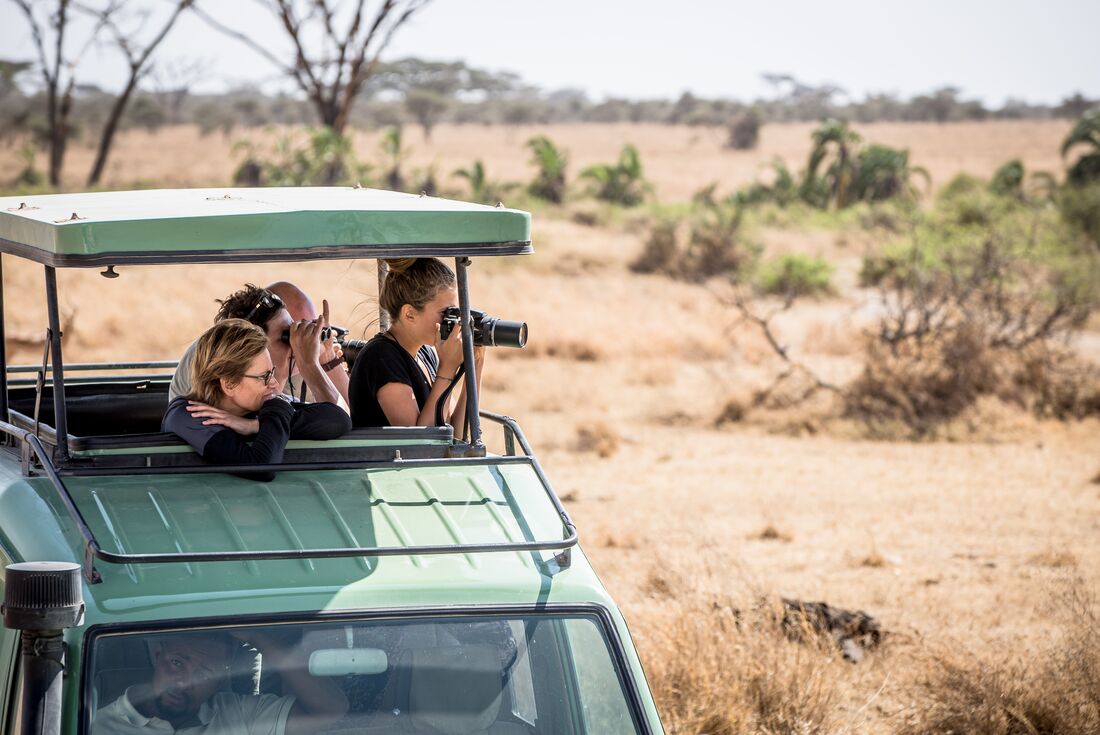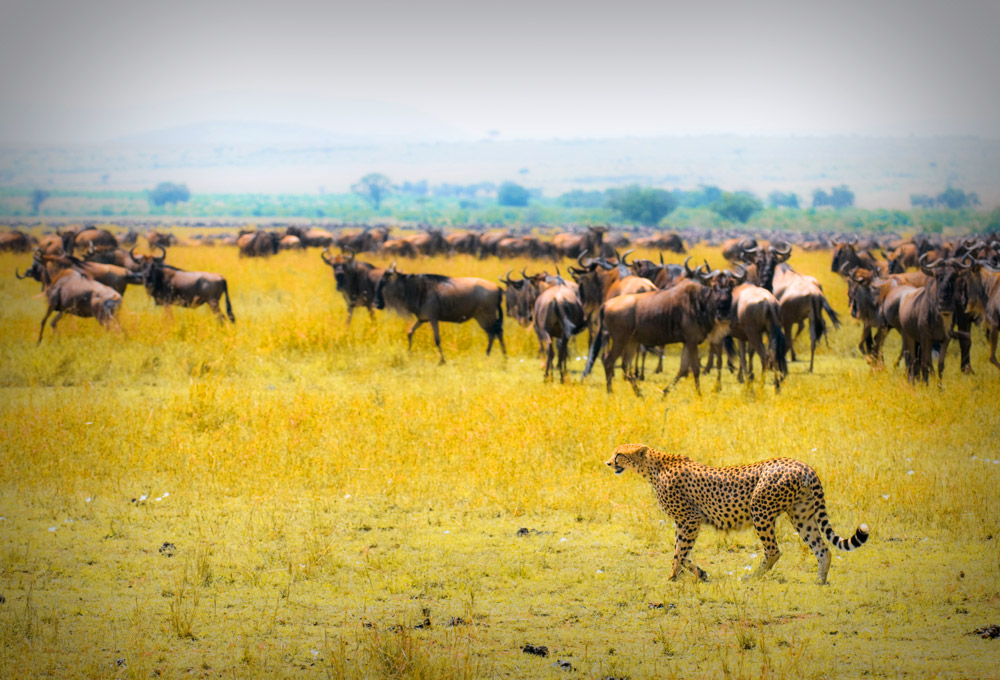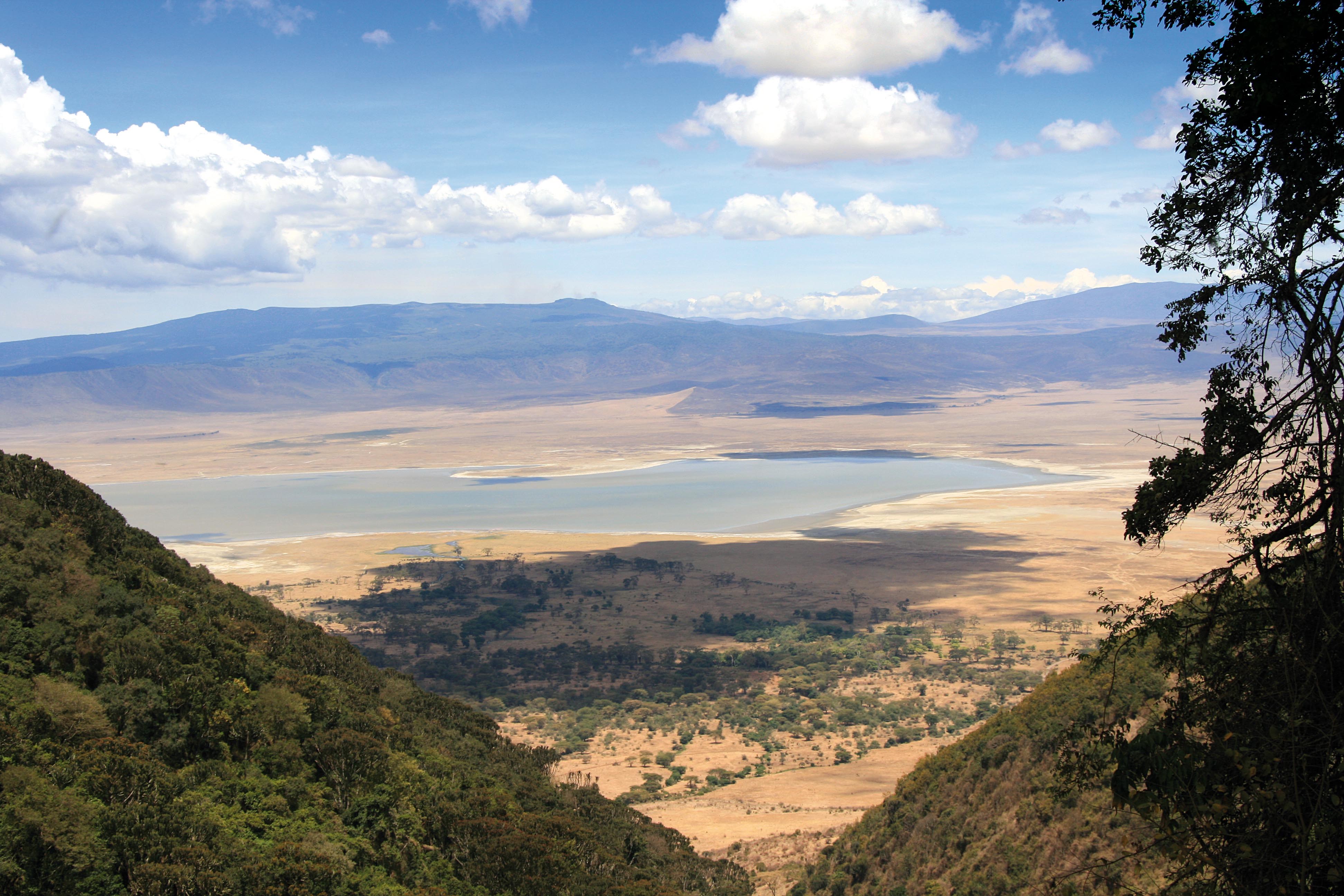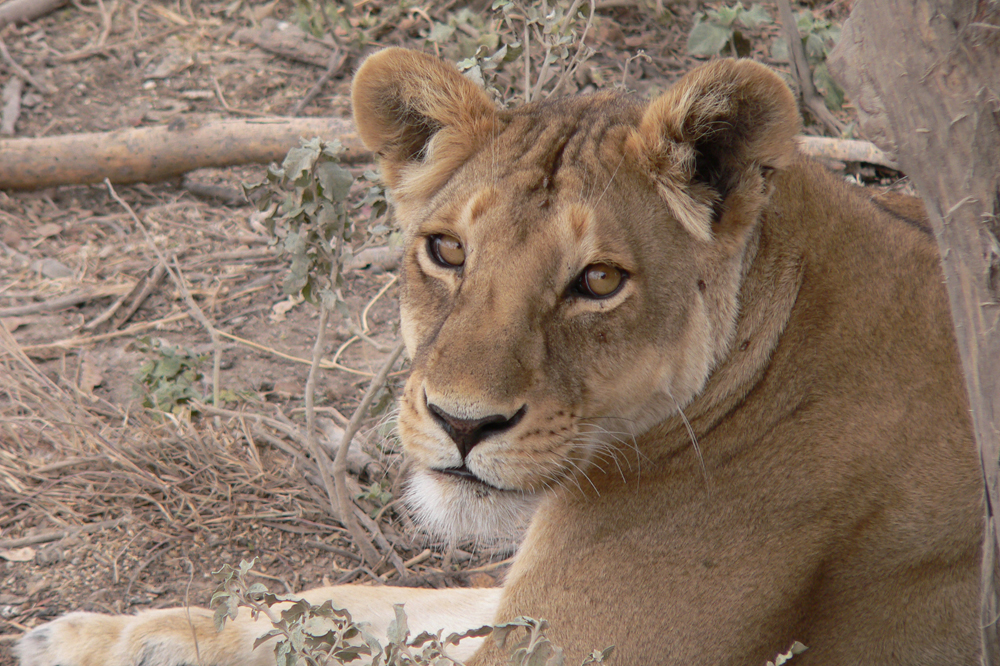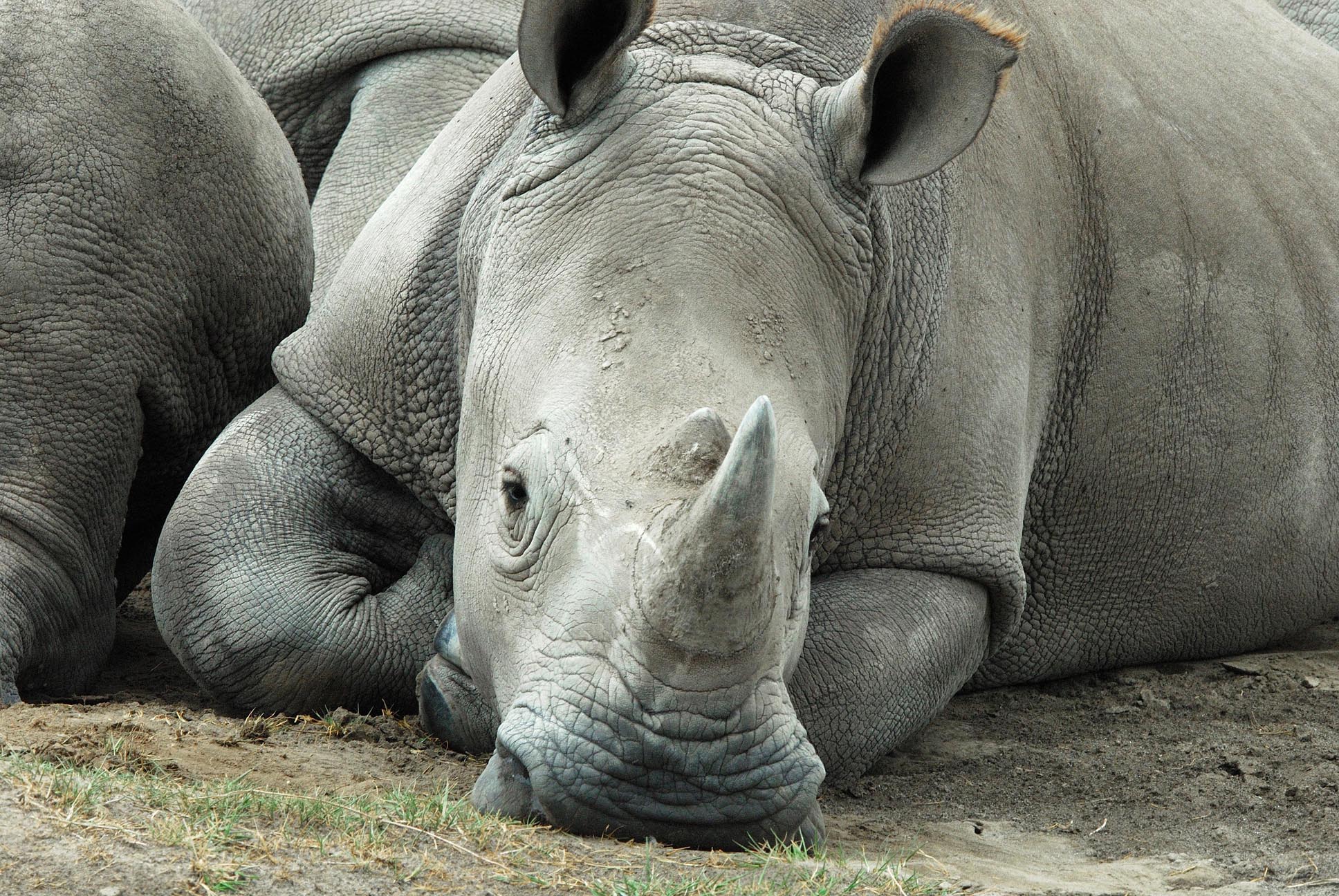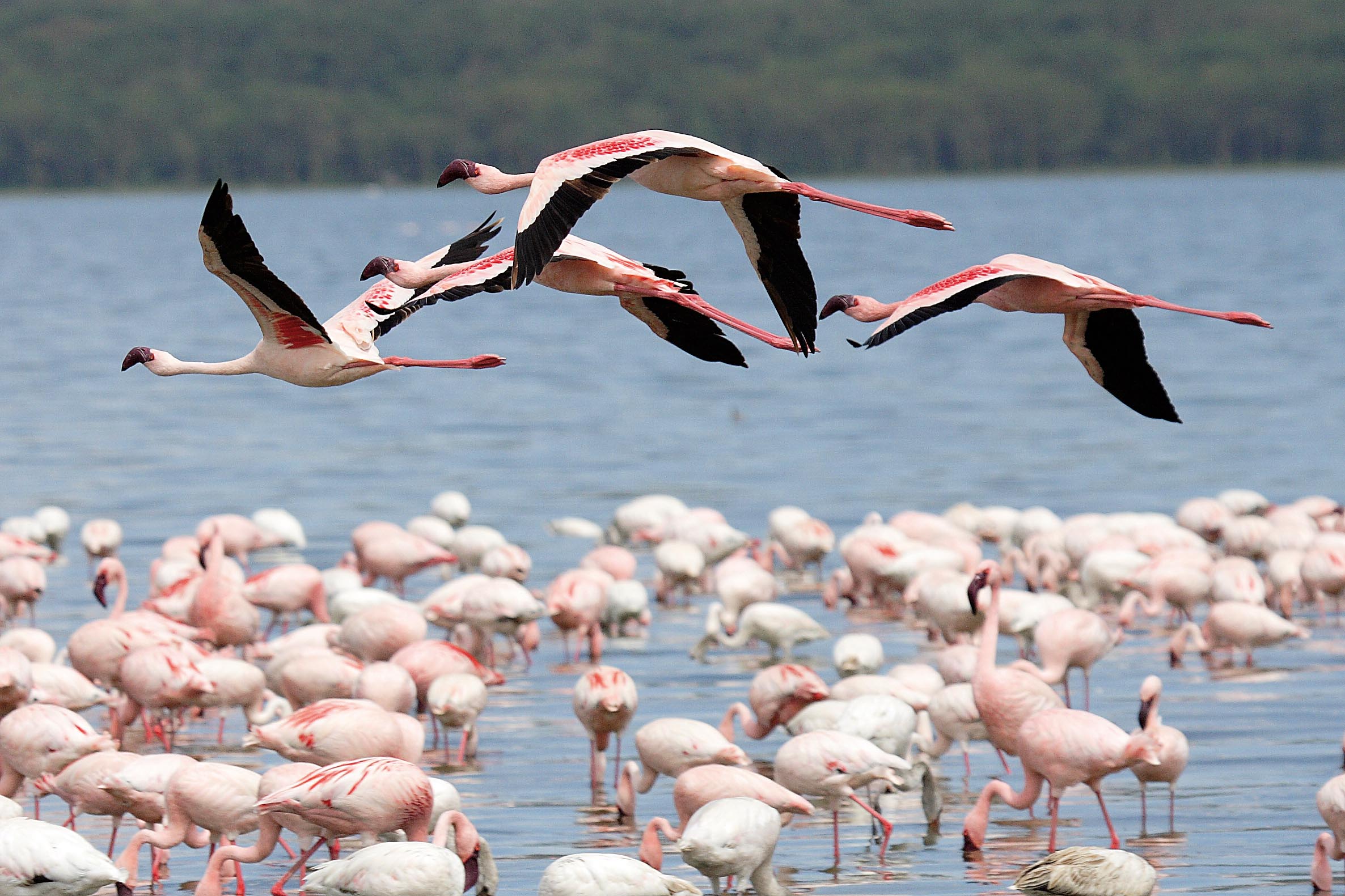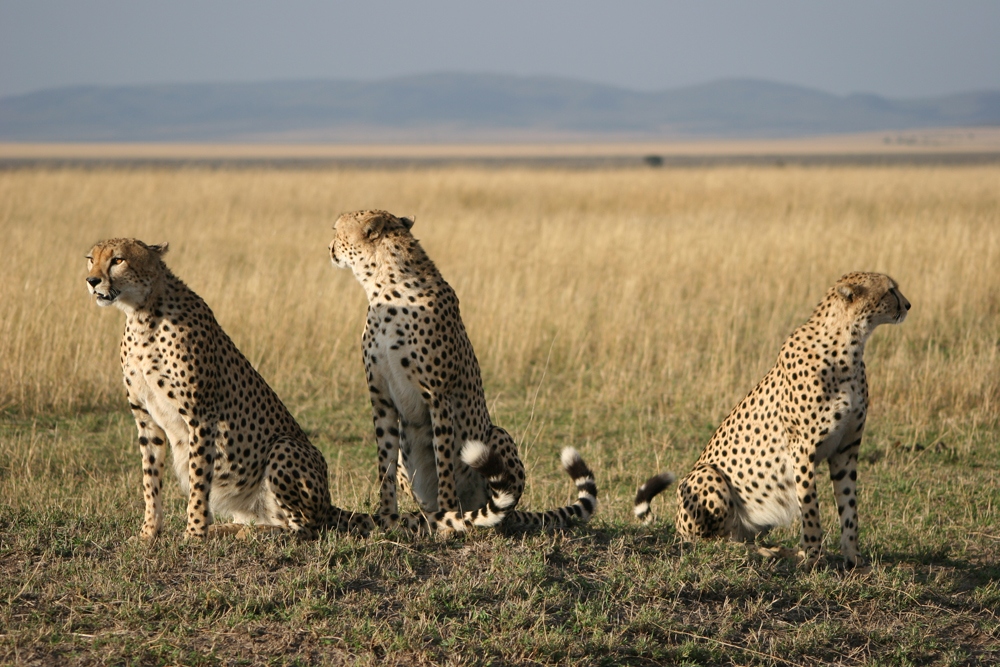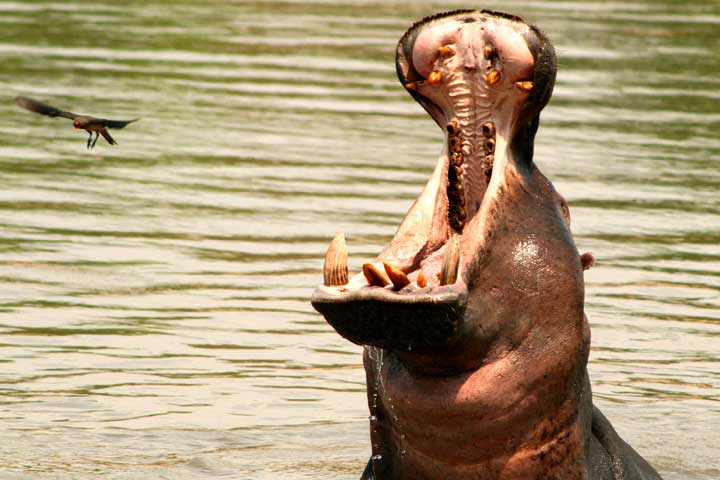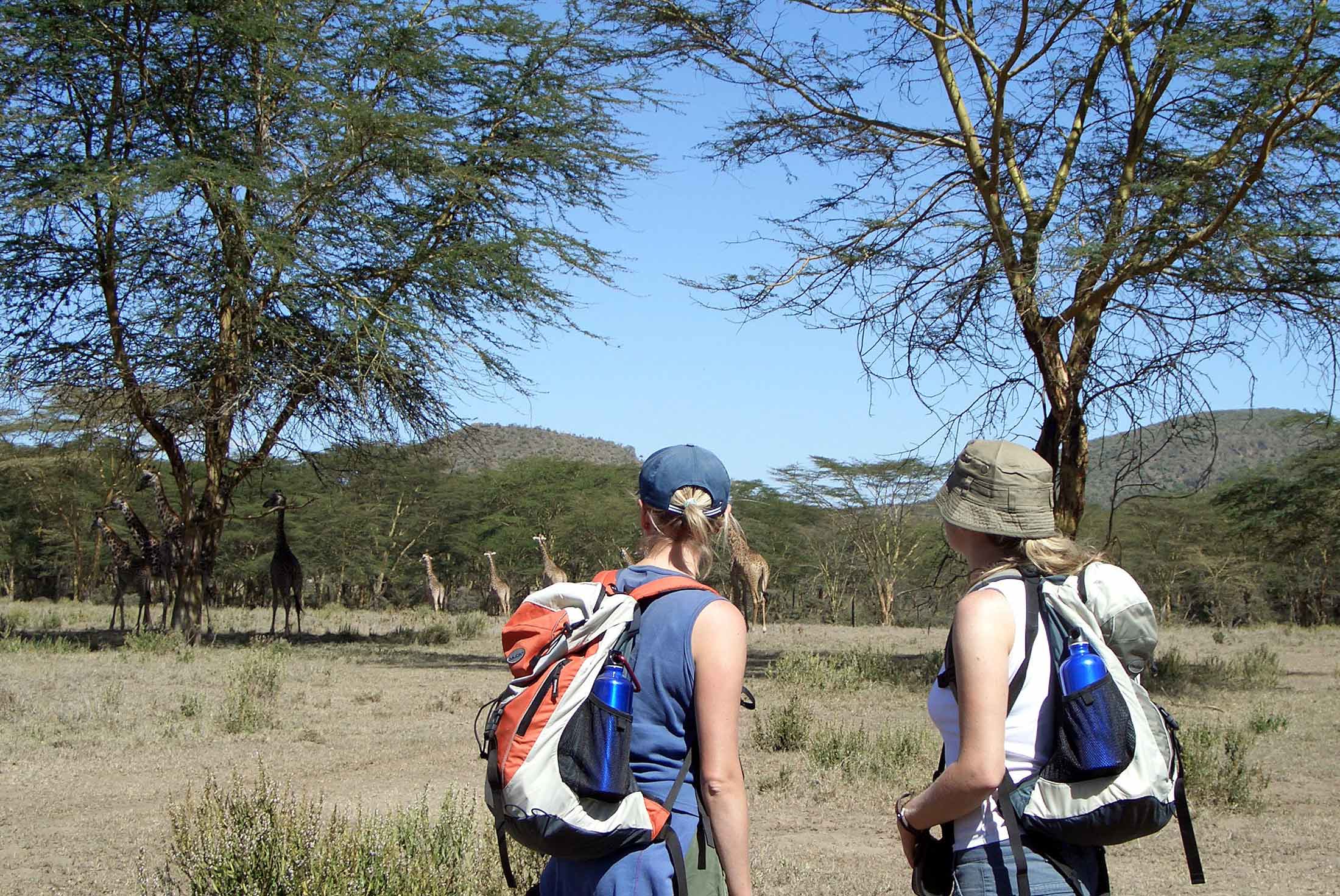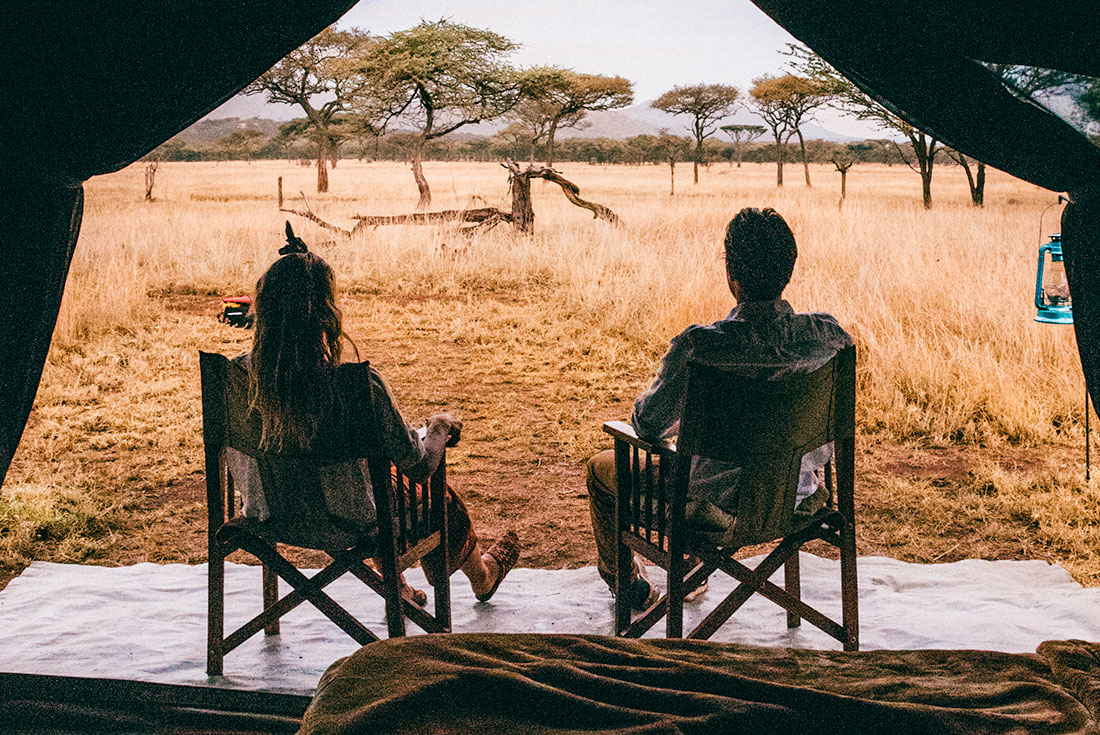- The Masai Mara National Reserve is filled with iconic vistas and animals, and here you’ll sleep in a permanent tented-camp under a blanket of stars, then wake to the sounds of calming birdsong.
- Meet the Maasai and gain an insight into the culture of this proud East African community with a village tour and talks by a local elder.
- Experience a real safari camp in the Serengeti – your Feature Stay Ang'ata Serengeti Tented Camp is perfectly located in the heart of the park but away from the crowds. Enjoy a private dinner under the stars during your stay here while listening to the sounds of the Serengeti.
- Enjoy panoramic views from the rim of an extinct volcano, then descend by 4x4 into its World Heritage-listed Ngorongoro Crater to be surrounded by wildlife.
- On your game drive within the Serengeti National Park stop to enjoy some bubbly and nibbles to witness the colours change in the late afternoon sky.
- Leave speed, stress and any concept of time behind on the enchanting white beaches of the island paradise of Zanzibar.
- Staying at the Tembo House Hotel in atmospheric Stone Town, enjoy meals at the beachfront restaurant while watching locals playing beach football.
23 Aug 2021
The Road to Zanzibar
PFRNC
Validity: 01 Jan 2020 to 31 Dec 2021
The vast grasslands of East Africa support the largest concentration of wildlife in the world. Here you'll get among the massive herds and their predators from the comfort of a 4WD Landcruisers with our expert local leaders at the helm. From Nairobi, travel to the waters of lakes Naivasha and Nakuru, then take in quintessential, breath-taking Africa in the Masai Mara, the Serengeti, and the magnificent Ngorongoro Crater – all filled with iconic vistas and animals. Enjoy plenty of included game drives and walks to spot the local inhabitants – lions, cheetahs, elephants and more. There is nothing quite like staying in the heart of these incredible national reserves, returning to a welcoming camp after days exploring the plains with guides who have grown up on this land, and falling asleep to the sounds of east Africa. Finishing on the famed Spice Island of Zanzibar is a perfect way to round off an unforgettable holiday.
Peregrine
Overland
4WD safari vehicle,boat,plane,private vehicle
3
You do not need any real fitness for this safari besides the ability to get in and out of the 4WD safari vehicles. However please note that the roads, particularly in Kenya, are in quite poor condition and you may experience a fair amount of bouncing around.
Hotel Panafric
Cnr Kenyatta Ave/Valley Road
Nairobi
KENYA
Phone: +254 202720822
Sarova Panafric is imposingly set in a quiet residential suburb, overlooking Kenyatta Avenue, thus commanding a panoramic view of Nairobi 's skyline. Panafric is set in spacious natural gardens less than a kilometre from the city centre.
An airport arrival transfer is included. This transfer is only valid if arriving on day 1 or if you have booked pre-trip accommodation through Peregrine. Please provide your flight details at the time of booking, or at a minimum 15 days prior to travel (note - we may not be able confirm request made within 15 days of travel). Once you have provided your details a transfer representative will be booked to meet you at the airport and transfer you to your hotel. Your driver will be waiting for you in the arrivals hall holding a Peregrine sign with your name. The driver will wait for an hour after your scheduled arrival time. If you fail to see our representative walk to the Grand Voyage Travel Agency Desk which is located at the left side of the arrival terminal and request your transfer. Grand Voyage Travel Agency: Tel: +254 722-717336 / +254 722-260627 Or +254 733 523 813 If you are making your own way to the hotel, there is a taxi stand outside the airport building. A taxi should cost approximately US$60, and must be paid in Kenyan Shillings. The Panafric is located roughly 20kms from Nairobi International Airport. Transfers should take around 30 minutes - but as Nairobi traffic can be heavy, it may take much longer.
Zanzibar Airport
Zanzibar Airport
Zanzibar
TANZANIA, UNITED REPUBLIC OF
1. A complimentary airport arrival transfer is included; valid if you are arriving on Day 1 or if you have booked pre-tour accommodation through us. You must provide your flight details to your booking agent at least 14 days prior to travel. 2. A single supplement is available if you’d prefer not to share a room on this trip. The single supplement applies to all nights of your trip and is subject to availability. Please speak to your booking agent for further information. 3. Solo travellers will need to pay for a single supplement for the Zanzibar section of this trip (Days 12 – 16). Sharing with another solo traveller is not possible during this section of the trip. 4. This trip includes a domestic flight. The luggage allowance is 20kg for check in luggage and 7kg for carry on. All your luggage must be soft-sided – no hard-sided check in or carry on luggage. 5. This trip ends in Stone Town on Day 16. Please do not book onward travel arrangements commencing before 3pm on the final day of the trip. 6. You will be unescorted for the Zanzibar section of this trip, but our local representatives will be on hand to look after you.
All group trips are accompanied by one of our group leaders. The aim of the group leader is to take the hassle out of your travels and to help you have the best trip possible. We endeavour to provide the services of an experienced leader however, due to the seasonality of travel, rare situations may arise where your leader is new to a particular region or training other group leaders. Your leader will provide information on the places you are travelling through, offer suggestions for things to do and see, recommend great local eating venues and introduce you to our local friends. While not being guides in the traditional sense you can expect them to have a broad general knowledge of the places visited on the trip, including historical, cultural, religious and social aspects. We aim to support local guides who have specialised knowledge of the regions we visit. If you were interested in delving deeper into the local culture at a specific site or location then your leader can recommend a local guide service in most of the main destinations of your trip.
It is recommended that you check your government's advice for their latest travel information prior to your departure. Peregrine strongly recommends the use of a neck wallet or money belt while travelling, for the safe-keeping of your passport, air tickets, cash and other valuable items. Please leave your valuable jewellery at home - you won't need it while travelling. Most of our hotels will have a safety deposit box, which is the most secure way of storing your valuables. A lock is recommended for securing your luggage. A specialist guide will accompany you on all included activities, however during your trip you'll have some free time to pursue your own interests, relax and take it easy or explore at your leisure. While the guides will endeavour to assist you with the available options in a given location, please note that any optional activities you undertake are not part of your itinerary, and Peregrine makes no representations about the safety of the activity or the standard of the operators running them. Please use your own good judgement when selecting an activity in your free time. Please also note that your specialist guide has the authority to amend or cancel any part of the trip itinerary if it's deemed necessary due to safety concerns. FIRE PRECAUTIONS: Please be aware that local laws governing tourism facilities in this region differ from those in your home country and not all the accommodation which we use has a fire exit, fire extinguishers or smoke alarms. TRAFFIC AND DRIVING CONDITIONS: Depending on where you come from please note that drivers in this part of the world may drive on the opposite side of the road from what you are used to. Look both ways before crossing any road. Be aware that traffic can be a little more chaotic than you might be used to at home. PETTY THEFT AND PERSONAL SAFETY: While travelling there is always the risk of pick-pocketing and petty theft, particularly in the more touristy cities. We recommend that you exercise caution when walking alone at night and encourage you to walk together and only on main, well-lit thoroughfares. Be particularly vigilant on public transport. Simple measures like carrying your day pack on your front, not hanging your bag over the back of your chair and wearing a money belt will reduce any chance that your valuables should go missing. SWIMMING POOLS: You may stay at hotels with unfenced pools and no life guard on duty. UNFENCED SITES: On some trips where you will be staying within a national park, please note that at times you may be staying in unfenced sites. While this is a fantastic experience, there are a few safety rules that must be adhered to. While staying in national parks it's important that you listen to any advice given by your leader/guide and the park rangers regarding responsible and safe behaviour. BALCONIES: Some hotel balconies don't meet UK standards in terms of the width of the balcony fence being narrower than 10cm. SEAT BELTS: Please be aware that local laws governing transportation safety may differ from those in the western world or from your home country and not all the transport which we use provides seat belts.
FIRE PRECAUTIONS Please be aware that local laws governing tourism facilities in this region differ from those in your home country and not all the accommodation which we use has a fire exit, fire extinguishers or smoke alarms. BALCONIES Some hotel balconies don't meet western standards in terms of the width of the balcony fence being narrower than 10cm. TRAFFIC AND DRIVING ON THE OTHER SIDE OF THE ROAD Depending on where you come from please note that drivers in this part of the world may drive on the opposite side of the road from what you are used to. Look both ways before crossing any road. Traffic can be a little more chaotic than you might be used to at home. Be aware! SEAT BELTS Please be aware that local laws governing transportation safety may differ from those in your home country and not all the transport which we use is able to provide seat belts. PICK POCKETING & PERSONAL SAFETY While travelling there is always the risk of pick-pocketing and petty theft, particularly in the more touristy cities. We recommend that you exercise caution when walking at night and encourage you to walk in groups and only on main, well-lit thoroughfares. Be particularly vigilant on public transport. Simple measures like carrying your day pack on your front, not hanging your bag over the back of your chair or on the floor and wearing a money belt will reduce any chance that your valuables should go missing. WATER SAFETY Please take care when taking part in any activities in the ocean, river or open water, where waves and currents can be unpredictable. It's expected that anyone taking part in water activities is able to swim and have experience in open water. All swimmers should seek local advice before entering the water. TRAVEL ADVICE & TRAVEL INSURANCE We recommend that you check your government's advice in relation to the areas you will be visiting for their latest travel information before departure and ensure that your travel insurance covers you for all areas your itinerary covers.
HOMOSEXUALITY IN TANZANIA Homosexuality is illegal in Tanzania (including Zanzibar) and is not tolerated in Tanzania’s conservative society. Public displays of homosexuality like holding hands or kissing in public places could lead to arrest and up to 30 years’ imprisonment. In June 2017, the Tanzanian Government announced a 'crackdown' on LGBQTI rights advocates operating in Tanzania, threatening arrest. We recommend that you refer to your government's official travel advisories for the most up to date advice before you travel.
BILHARZIA Bilharzia is a parasitical disease which is usually spread by swimming in contaminated water. It can be assumed that the infection is present, to a greater or lesser extent, in almost all water sources, but most especially in shallow reedy waters in the vicinity of villages. Although the adult parasites do not themselves cause a great deal of harm, after about 4-6 weeks they start to lay eggs, which triggers an intense but usually ineffective immune response, the symptoms of which can include fever, cough, abdominal pain, and an itchy skin complaint known as safari itch. After a while the symptoms settle down and the patient is left with a sense of feeling tired all the time.
PASSPORT You will need a valid passport to travel internationally. As a general rule, most countries require that your passport has a minimum of 6 months validity remaining. Your passport details are required to complete your booking. Please ensure the name on your passport matches the name on your booking and airline tickets exactly and contact us immediately if there are any errors. We recommend taking copies of the main passport pages and other important documents with you as well as leave copies at home with family or friends. VISAS Visas are the responsibility of the individual traveller. Entry requirements can change at any time. It is important that you check your government's foreign travel advisories along with the consular website of the country or countries you are travelling to for the most up to date information specific to your nationality and circumstances. Please be aware that not all visa information found online from other sources may be valid while COVID-19 restrictions are in place. Visas can take several weeks to process, so make sure you research the requirements as soon as you have booked your trip to allow for obtaining any necessary documents as well as the application and processing time. Your booking consultant can advise on a visa processing service or you can apply yourself directly through a consulate. COVID-19 Entry and Exit Requirements Below you will find general visa advice about the destinations on your trip. Due to constantly evolving COVID-19 requirements and restrictions, please refer to your government's foreign travel advice for the most up to date information.You may also refer to our travel alert page for more info https://www.intrepidtravel.com/en/travel-alerts Make sure you are familiar with the current border measures and entry requirements as these are quite complex and changing frequently without notice. Please also ensure you have a travel insurance policy that covers your travels as well as medical or COVID-19 related expenses within the country. RETURN TRAVEL Please ensure you stay up to date with any current testing or quarantine requirements for returning to your home country or transiting through other destinations after the completion of your tour. We are able to help facilitate taking a COVID-19 test while on trip. Please ensure you have funds available to cover the cost of this test which will be payable directly to the testing site. Your Intrepid Tour Leader will provide more details at the group meeting as well as assist with booking appointments for all travellers who need to be tested. Starting from 1st January 2021, visas will no longer be issued on arrival in Kenya. If you require a visa, it is mandatory that you hold a Kenyan electronic visa (e-visa) prior to leaving your home country or boarding an aircraft. Single-entry visas (business or tourism) are USD50, EUR40, or GBP30 and a transit visa (valid for three days) is USD20. The single entry visa allows for multiple entries in to Kenya for a period of 90 days provided you have not left East Africa. The four-step e-Visa procedure is completed through the immigration website: www.evisa.go.ke and requires visitors to submit an application form and passport-sized photo. e-Visas can take around seven working days to process. Visitors will then be required to present their printed e-Visa upon entry to Kenya. **IMPORTANT** If you are travelling on one of our itineraries that re-enters Kenya, you will need to take multiple copies of your e-Visa - one to present at each border crossing. TANZANIA: It is possible to obtain a tourist visa for a single entry at any one of the following main entry points to Tanzania, subject to the fulfilment of all immigration and health requirements for approximately USD$50 in cash (post 2006 USD): -Dar es Salaam International Airport -Zanzibar International Airport -Kilimanjaro International Airport (KIA) -Namanga Entry Point (Tanzania-Kenya border point) -Kasumulu Border crossing -Isebania Border crossing Alternatively you will need to purchase your visa in advance at any Diplomatic or Consulate Mission of the United Republic of Tanzania abroad. The cost is approximately USD100 depending on nationality and should take one business day. At the present time you do not require a multi entry visa to Kenya, Tanzania and Uganda due to an agreement between the three countries (i.e. if you exit Kenya to Tanzania you can re-enter Kenya on the same visa). However if your trip visits Tanzania twice after a visit to a country other than those listed above, you may need to purchase two visas. Visa processes at both Kilimanjaro International Airport and land border crossings can take some time so we recommend all travellers obtain a visa in advance. If obtaining a visa on arrival at Kilimanjaro International Airport you will be required to: o Queue for a Government Control Number o Queue to pay for this at the bank o Queue for Immigration to check and issue the visa For the purpose of the visa application you can use the following address: Kibo Palace Hotel PO Box 2523 Old Moshi Road Arusha - Tanzania Phone: +255 272544472 BORDER CROSSINGS There will be 1 border crossing on this trip: Day 7: Kenya to Tanzania at Isebania border crossing
The Masai Mara National Reserve is filled with iconic vistas and animals, and here you’ll sleep in a permanent tented-camp under a blanket of stars, then wake to the sounds of calming birdsong.
Meet the Maasai and gain an insight into the culture of this proud East African community with a village tour and talks by a local elder.
Experience a real safari camp in the Serengeti – your Feature Stay Ang'ata Serengeti Tented Camp is perfectly located in the heart of the park but away from the crowds. Enjoy a private dinner under the stars during your stay here while listening to the sounds of the Serengeti.
Enjoy panoramic views from the rim of an extinct volcano, then descend by 4x4 into its World Heritage-listed Ngorongoro Crater to be surrounded by wildlife.
On your game drive within the Serengeti National Park stop to enjoy some bubbly and nibbles to witness the colours change in the late afternoon sky.
Leave speed, stress and any concept of time behind on the enchanting white beaches of the island paradise of Zanzibar.
Staying at the Tembo House Hotel in atmospheric Stone Town, enjoy meals at the beachfront restaurant while watching locals playing beach football.
Purpose-built 4WD Safari Landcruisers are used for the duration of the trip. This itinerary features some long travel days, which can be exacerbated by bumpy African roads. It is recommended that you pay close attention to the given approximations of driving hours. As the early bird catches the worm, the early camper sights the animals. There will be many early starts either to make use of the better safari time or to beat the morning traffic on long travel days. You will be unescorted for the Zanzibar sector of this itinerary, but our local representatives will be on hand to look after you.
GENERAL HEALTH All travellers need to be in good physical health in order to participate fully on this trip. When selecting your trip please make sure you have read through the itinerary carefully and assess your ability to manage and enjoy our style of travel. Please note that if in the opinion of our group leader or local guide any traveller is unable to complete the itinerary without undue risk to themselves and/or the rest of the group, we reserve the right to exclude them from all or part of a trip without refund. You should consult your doctor for up-to-date medical travel information or for any necessary vaccinations before departure. We recommend that you carry a first aid kit as well as any personal medical requirements as they may not easily be obtained while travelling. COVID-19 The safety and wellbeing of our travellers, leaders, crew, staff, and suppliers continues to remain our highest priority as we travel. You can read more about how we will keep you safe on our trips, including our COVID-19 Health & Safety Guidelines here: https://www.peregrineadventures.com/safe-travels HEALTH SCREENING If you are unwell prior to travelling, please stay at home and contact us to make alternative arrangements. At the group meeting, you will be asked to complete a self-screening health form and report any COVID-19 symptoms as well as any close contact with someone who has suspected or confirmed COVID-19. If you are displaying any symptoms or have any health concerns at this time, we will follow the advice of local health authorities to determine whether medical assistance, isolation or further action is required. We ask all travellers to continue to monitor their health throughout their travels and report any relevant symptoms to their tour leader. TESTING & VACCINATION POLICY From 1st May 2021 we have introduced new safety measures that apply on all of our trips, except for tours in Australia and New Zealand. You will need to show either of the below to your leader at the Group Meeting on Day 1 of your trip: - Proof of COVID-19 vaccination, or - Proof of negative COVID-19 test conducted no more than 72 hours before day 1 of your trip, or - Proof of recovery documentation In addition, if you’re aged 70+ or have an existing health condition that puts you at a higher risk of serious COVID-19 disease, you are also required to provide proof of vaccination before you can join a trip. This policy is in addition to any specific testing or vaccination requirements for entry to a destination or required by your airline. For more information, including a detailed FAQ about this policy, please visit: https://www.peregrineadventures.com/covid19 YELLOW FEVER: A valid international certificate of vaccination against Yellow Fever is required in many countries if you are arriving from a country with risk of yellow fever (eg. Kenya). You may need to present this on arrival at the airport or border crossing. Some countries will refuse entry if you are unable to present your certificate. It's also quite common for your home country to request a Yellow Fever certificate on your arrival back home. It is your responsibility to check with your doctor well in advance of leaving home about the Yellow Fever requirements for the countries you'll be visiting. DRINKING WATER As a rule we recommend you don't drink tap water, even in hotels, as it may contain much higher levels of different minerals than the water you are used to at home. For local people this is not a problem as their bodies are used to this and can cope, but for visitors drinking the tap water can result in illness. Generally this isn't serious, an upset stomach being the only symptom, but it's enough to spoil a day or two of your holiday. Many hotels and lodges provide safe drinking water, while bottled water is another alternative. Water consumption should be about two litres a day. Rehydration salts, motion sickness tablets, and diarrhoea blockers are available from many pharmacies. TSETSE FLY: It is best to avoid dark coloured clothes such as blue and black while on safari. These colours can attract the biting tsetse fly.
Your group leader will endeavour to cater for specific dietary requirements where possible, and vegetarianism and gluten intolerance will be catered for in most instances. Please notify your group leader of any dietary requirements in your group meeting at the start of the trip. For those suffering from particular food allergies, your group leader will endeavour to disclose to their fullest knowledge the main ingredients in dishes being consumed. It is, however, your personal responsibility to ensure that you do not ingest any foods to which you are allergic. Alcoholic or non-alcoholic beverages are not part of included meals. LODGE-PACKED MEALS: There are a number of days on this itinerary where your breakfast or lunch will be a ‘packed picnic meal’ provided by our lodge. Packed meals usually consist of a sandwich, a piece of fruit, a juice, and a snack such as potato chips/crisps, nuts, muffin, or a muesli bar. On some days your crew will shop and prepare lunches themselves using the truck picnic gear and utensils. This usually happens when we have early morning game drives and want to get into the park by sunrise, are out in National Parks all day, or in some instances, en-route to our next destination when there is little or no alternatives.
When it comes to money matters on the trip, every traveller is a little different. You know your spending habits better than we do, so please budget a sensible amount for things like meals not included, drinks, shopping, optional activities, tipping and laundry. It’s always better to bring a little more than you think you’ll need. Also make sure you’ve read your trip details thoroughly so you know what’s included in the trip price and what isn’t. This should make budgeting a little easier. You’ll find this info in the Inclusions section of your Essential Trip Information (that’s this document). Please note: all recommendations for additional costs, tipping etc. are in USD. You will need to convert these into the relevant local currency. MEALS NOT INCLUDED For lunches not included, a budget of USD10 to USD15 per meal will be more than sufficient. For dinners not included, your leader will normally recommend options and restaurants where you can safely try the local specialties of the region. Expect meals to cost between USD12 to USD25 for a main. These are indicative prices only. If you are in a tight budget or are happy to try local food, you can eat cheaper than this.If you want to try just the finest food at the finest restaurants, then you can expect meals to cost as much as in western countries. TIPPING Gratuities aren’t compulsory on your trip, but they can make a big difference to locals employed in the tourism industry. If you are happy with the services provided, a tip is an appropriate way to thank them. While it may not be customary to you, it is of great significance to the people who will take care of you during your travels, inspires excellent service, and is an entrenched feature of the tourism industry across many Intrepid destinations. On the Kenya and Tanzania group trip section gratuities for all services are included in the cost of your trip. However you may also consider tipping your leader and crew (if applicable) as these are not included. The amount is entirely a personal preference; however as a guideline USD5 to USD6 per staff member, per day can be used. Of course you are free to tip more or less as you see fit, depending on your perception of service quality and the length of your trip. Remember, a tip is not compulsory and should only be given when you receive excellent service. On your Zanzibar independent section tips are not included. Therefore as a guide we recommend: - Restaurants – When checking the bill, if there’s an addition of 10% service charge, there’s no requirement for tipping. Otherwise, 10% of the total bill amount is appropriate. - Lodge staff - Tipping boxes are often in the common areas and approximately USD2 is appropriate - Guides & Drivers – You may also consider tipping your crew for outstanding service throughout your trip. The amount is entirely a personal preference; however as a guideline USD3 to USD5 per staff member, per day can be used. Of course you are free to tip more or less as you see fit, depending on your perception of service quality and the length of your trip. Remember, a tip is not compulsory and should only be given when you receive excellent service. EMERGENCY FUNDS We try to plan for every eventuality, but there are still some things beyond our control. Please make sure you bring an extra USD500 for emergencies (e.g. natural disasters or civil unrest). Sometimes these things necessitate last minute changes to our itineraries, and we can’t guarantee there won’t be some extra costs involved. CREDIT CARDS, ATMS AND MONEY EXCHANGE: Credit cards are generally accepted in tourist shops and some restaurants across Africa. Visa and Mastercard are generally preferred over American Express, Diners, etc. Smaller venues take cash only. Foreign currency is easily changed at exchange bureaus and they generally offer the best rates. With ATMs being increasingly available in the many major towns and cities and even some campsites, credit or debit cards are a convenient way to access money. Be aware that your withdrawing limit may vary from country to country (regardless of your withdrawing limit in your home country) and it can be as low as the equivalent to USD100 per day. Throughout Africa, cards with the Visa logo are most readily recognised, although MasterCard is also accepted in most places. A charge is made for each international transaction - please check with your bank how much this fee will be. Check with your bank before leaving home that your card can be used as a debit card in Africa. You may also want to notify your bank that you are visiting Africa as it's not unknown for banks to freeze cards which show sudden transactions in other countries. If you're on a multi-country tour, your tour leader will be able to give you an approximate idea of how much money you may need for your stay in each country. PLEASE NOTE: Many businesses and banks in Africa, especially East Africa, do not accept US dollar notes older than 2006. If you are bringing USD, we strongly recommend large bills in good condition, 2006 series onwards only. Any old or damaged notes may not be accepted. COMMISSIONS Unfortunately, commissions in exchange for recommending particular shops or restaurants are an ingrained part of the tourism industry. Rather than turning a blind eye, we’ve tried to legitimise the practise with a centralised fund. Moneys are collected from recommended and fully vetted suppliers and funnelled back into our business. This keeps the trip cost low (for us and for you) and makes sure you only get the best experiences. If you’re unhappy with any places your leader recommends, or feel the quality of the trip is being compromised in any way, please let us know in your feedback.
We recommend you pack as lightly as possible and make sure that you are able to carry and lift your own luggage, and walk with it for short distances. Most travellers carry their luggage in a backpack, although an overnight bag with a shoulder strap would suffice if you travel lightly. Smaller bags or backpacks with wheels are convenient although we recommend your bag has carry straps. You'll also need a day pack/bag to carry water and a camera etc for day trips. Below are some ideas and helpful tips on what you specifically need for this trip. ESSENTIALS: - Closed in shoes will help to protect your feet from cuts and scratches when walking through bush/grass-lands and will also act as a barrier protection in rare cases against bites or stings from dangerous animals in this environment. - Lightweight clothing. You will need to bring a mixture of lightweight clothing, some warm items for the evenings, and long shirts and pants for protection against mosquitoes in the malaria areas. Clothes should be easy to wash and dry. Some people like to take jeans for evenings out but they can be tough to dry and should not be used for trekking. Avoid nylon and other synthetics, which can be very uncomfortable in hot weather. Ex-military or military style clothing and equipment is NOT recommended. - Sun protection - hat, sunscreen, sunglasses. RECOMMENDED: - A good quality, high-beam headlamp or torch for around the lodges and permanent tented camps at night. Some properties have limited outdoor lighting and are powered by generators that switch off at a certain time. - A waterproof/windproof jacket is a good idea for wet days, and early morning or evening game activities when it can be cool. - Warm fleece and beanie for morning and evening game drives. - Personal medical kit. Your guide will carry a large kit, but we recommend you carry items such as mild pain killers, electrolytes and bandaids. - Insect repellent. - Water bottle. We recommend at least a 1 litre capacity. Our vehicles have large tanks of treated water for refills. - Camera with good zoom. - Binoculars. OPTIONAL: - Ear plugs to guard against a snoring room-mate. - A good book, a journal or smart phone with music (and a power bank). LUGGAGE LIMIT: Luggage is stored in a dedicated compartment at the back of our overland vehicles. Please keep your luggage to a minimum. One small soft-sided bag plus a day pack (no more than 15-20kgs in total per person) is essential. Please do not bring hard/externally framed suitcases as they are difficult to store and can damage equipment and other passengers' belongings. If your trip is beginning and ending at the same location, excess luggage can usually be stored at your arrival/departure hotel and can be collected after your trip. VALUABLES: Please try to avoid bringing unnecessary valuables. Use your hotel safes and the safe on the overland truck to store the bulk of your money, passport, and airline tickets. It’s also a good idea to purchase a money belt or pouch that is easily hidden. We strongly recommend that you photocopy all important documents e.g. airline tickets, passport, vaccination certificate, etc. and keep the copies separate from the originals. While not valid, a photocopy makes it much easier to obtain replacements if necessary. BATTERIES/POWER: We recommend that you carry an extra battery for your camera and/or a power bank. Our overland vehicles are equipped with multiple power boards which may be used at the crew’s discretion. Bear in mind that only a minimal number of items can be charged at a time and will not be allowed if there is a risk of running the vehicle’s batteries low. Batteries may also be recharged from hotel room wall sockets. Hotels and lodges have electricity and charging of batteries is advised before checking out the following day. CONSERVATIVE DRESS FOR WOMEN: When packing, be aware that there are a wide range of cultural differences for women in Africa. We recommend our travellers dress modestly, with skirts or shorts that reach just above the knee and tops that cover shoulders at a minimum. If visiting coastal areas wear a cover-up when you step off the beaches.
LUGGAGE ALLOWANCE ON DOMESTIC AFRICAN FLIGHTS: Please note that internal flights carry a restriction of a single bag weighing no more than 20kg per person. Space and weight restrictions are strictly enforced. Any excess baggage may not be loaded on to the aircraft. If your trip is beginning and ending at the same location, excess luggage can usually be stored at your arrival/departure hotel and can be collected after your trip.
PLASTIC BAG BANS ACROSS AFRICA While Namibia holds people liable to a fine of N$500 or imprisonment for entering Game Parks with a plastic bag, Botswana has announced a countrywide ban on plastic bags to come into effect on 1 November 2018. The ban will make the importing, trading and commercial use of plastic bags a criminal offence. Exceptions will be made for plastics that are essential for health and hygiene. With these announcements, Botswana and Namibia join other African countries such as Tanzania, Kenya, Ethiopia, Uganda, Tunisia, Morocco, Rwanda, Uganda, Somalia and Eritrea that have banned plastic bags. South Africa imposed a levy on plastic bags in 2004 but they have not yet been banned. Many countries are strictly enforcing this and have been searching luggage at border points. Camping stores are good for obtaining waterproof reusable bags, for dirty laundry etc, prior to departure.
WEATHER IN KENYA Kenya receives a lot of tourists in January and February when the weather is hot and dry and generally the most pleasant. It’s generally less busy from June to September, but the weather is still dry during this time. Wet season is from March to May and October to December. WEATHER IN TANZANIA Tanzania’s climate changes with its diverse landscapes, so expect variances in weather in different parts of the country. Generally, January and February are the high season for travel in Tanzania as the hot, dry weather is generally considered to be the most pleasant. Expect afternoon downpours during the wet season (from March to May); however, during this time you’ll find fewer tourists in Tanzania so you won’t have to compete with crowds.
Everyone has the right to feel safe when they travel. We don’t tolerate any form of violence (verbal or physical) or sexual harassment, either between customers or involving our leaders, partners or local people. Sexual relationships between a tour leader and a customer are strictly forbidden. Use or possession of illegal drugs will not be tolerated on our trips. If you choose to consume alcohol while travelling, we encourage responsible drinking and expect that you’ll abide by the local laws regarding alcohol consumption. The sex tourism industry is known to exploit vulnerable people and have negative consequences on communities, including undermining the development of sustainable tourism. For this reason, patronising sex workers will not be tolerated on our trips. By travelling with us you are agreeing to adhere to these rules. You must at all times comply with the laws, customs, foreign exchange and drug regulations of all countries visited, and you also agree to travel in accordance with our Responsible Travel Guidelines. The decision of the group leader is final on all matters likely to affect the safety or well-being of any traveller or staff member participating in the trip. If you fail to comply with a decision made by a group leader, or interfere with the well-being or mobility of the group, the group leader may direct you to leave the trip immediately, with no right of refund. We may also elect not to carry you on any future trips booked. If you feel that someone is behaving inappropriately while travelling with us, please inform your tour leader or local guide immediately. Alternatively, contact us on the emergency contact number detailed in the Problems and Emergency Contact section of this Essential Trip Information. For additional Conditions of Carriage regarding COVID-19, see here: https://www.intrepidtravel.com/conditions-carriage
Can’t stop thinking about your adventure? Tell us all about it! We read each piece of feedback carefully and use it to make improvements for travellers like you. Share your experience with us at: https://www.peregrineadventures.com/feedback
Before you travel please download our pre-departure checklist to make sure you are fully prepared for your trip: http://www.peregrineadventures.com/pre-departure-travel-checklist
TRANSFERS AND ACCOMMODATION ISSUES: For transfers and accommodation issues, Peregrine's Kenya Office can be reached on their 24 hour number +254 733 523 813 ISSUES ON YOUR TRIP: While we always endeavor to provide you the best possible holiday experience, due to the nature of travel and the areas we visit sometimes things can and do go wrong. Should any issue occur while you are on your trip, it is imperative that you discuss this with your group leader/specialist guide or our local representative straight away so that they can do their best to rectify the problem. We recognise that there may be times when your group leader/local partner may not be able to resolve a situation to your satisfaction - if this is the case, please ask the leader/guide to speak to their direct manager. BOOKING ENQUIRIES / ISSUES For general enquiries or questions about your booking, please contact your agent or adventure specialist, or visit us at: www.peregrineadventures.com/contact-us CRISIS AND EMERGENCIES In case of a genuine crisis or emergency please contact our local ground representative on the number below: Peregrine’s Local Operator: +254-736-213-383 Peregrine’s Local Operator: +254 788 585 065
Responsible travel is important to Peregrine. Maintaining our integrity and upholding principles of sustainable development are core to our travel ethos. Our values are ingrained in the culture of our business and in the design of our trips. We respect the people, cultures and local environments that we encounter while travelling and encourage the spread of good will and cross-cultural sharing. We are committed to making a positive contribution wherever possible. Read more about responsible travel with Peregrine here: https://www.peregrineadventures.com/responsible-travel
Help us change thousands of lives by creating meaningful work and supporting skills training in communities around the world. The Intrepid Foundation is the not-for-profit for Peregrine Adventures, a brand of the Intrepid Group, and works with local organisations around the world to improve the livelihoods of vulnerable individuals and communities through sustainable travel experiences. With our travellers’ help, we’ve contributed more than AU $6 million to over 100 community organisations since 2002. Did you know that tourism is one of the biggest contributors to the global economy, making up 1 out of every 10 jobs? That’s why we support local projects that create meaningful jobs and give people the skills they need to work in the destinations we take you to. And it’s why we exist – to make it easy for travellers to give back to the communities and places they’ve been in an effective and meaningful way. Intrepid Group covers all administration costs, every cent goes directly to the projects. Donating is simple and secure. Please ask your leader for information about the projects we support through The Intrepid Foundation or visit our website: http://www.theintrepidfoundation.org/ Organisations and projects currently supported in Kenya include: The Thin Green Line Foundation (TGLF) advocates for the safety, fair treatment, and protection of Rangers across the world. https://www.theintrepidfoundation.org/the-thin-green-line-foundation East African Wild Life Society (EAWLS) promotes the conservation and wise use of the environment and natural resources in East Africa. The Intrepid Foundation directly supports EAWLS anti-poaching programs that protect wildlife in the Masai Mara ecosystem. These anti-poaching projects rely heavily on Rangers to patrol areas where wildlife exists and all donations will go towards funding the purchase of equipment the Rangers need to carry on protecting the amazing wildlife found in the Masai Mara. www.theintrepidfoundation.org/projects/east-african-wildlife-society/ Eden Reforestation Projects works with local people to identify lands devastated by deforestation – both legally and illegally – that the community wants to restore. Deforestation often offers income in the short-term, but the people bordering these areas soon face the consequences, from increased risk of landslides to a loss of habitat for wildlife. By investing in communities’ reforestation efforts of their own land, Eden Projects empowers local people to decent employment and ensures their commitment to protecting the forests for generations to come. The project is also committed to prioritising skill-building and employment for women and single parents. https://www.theintrepidfoundation.org/eden-reforestation-projects Organisations and projects currently supported by The Intrepid Foundation in Tanzania include: Kilimanjaro Porters Assistance Project (KPAP) provides porters with support, advocacy and education, and works with the travel industry to ensure good climbing practices and conditions for the hardworking porters. https://www.theintrepidfoundation.org/kilimanjaro-porters-assistance-project-2019
If you require a Sleep Apnea Machine to sleep please ensure that it is battery operated. Lodges and Permanent Tented Camps are often powered by generators which are turned off during the night. Feature Stay: Doze off to the sounds of the bush from the comfort of your tent at Ang'ata Serengeti Camp. This eco-friendly mobile tented camp in the very heart of the Serengeti is a wildlife experience not to be missed.
We use 4 wheel drive safari vehicles throughout this itinerary. Your Peregrine Leader will also drive the vehicle. Where we have a group size of more the 6 travellers we will use two vehicles and 2 Peregrine Leaders. We use 4 wheel drive safari vehicles in the East Africa portion of this itinerary. Where we have a group size of more than 6 travellers we will use two vehicles. Each 4x4 safari vehicle driver is also a certified safari guide. A Peregrine leader will accompany the group and rotate between the two vehicles when on game drives or in transit.
Travel insurance is compulsory on all our trips for those travelling internationally. We require that at a minimum you are covered for medical expenses including emergency repatriation. If you are travelling within your home country or region please confirm before travel that you are entitled to access the public medical system easily should an accident occur. We strongly recommend all travellers have a policy that also covers personal liability, cancellation, curtailment and loss of luggage or personal effects. For international trips, you will not be permitted to join the group until evidence of travel insurance and the insurance company's 24-hour emergency contact number has been sighted by your leader. If you have credit card insurance your group leader will require details of the participating insurer/underwriter, the level of coverage, policy number, and emergency contact number rather than the bank's name and your credit card details. Please contact your bank for these details prior to arriving in-country. Travellers who reside within the European Union or Switzerland receive basic international health insurance, so travel insurance is not mandatory under European Union Law. However, as this does not cover situations such as emergency rescues, private health care, or repatriation to their home country, comprehensive travel insurance is strongly recommended. European Union or Swiss travellers who decline travel insurance when travelling outside of their home region must sign a Travel Insurance Waiver Form at the Group Meeting. For assistance with travel insurance or other services, please visit the link below:
COMPULSORY SINGLE SUPPLEMENT: Single travellers will have there own room therefore there is a compulsory single supplement in conjunction with this trip. As you travel on a group trip you will be exposed to all the pleasures and maybe some of the frustrations of travelling in a group. Your fellow travellers will probably come from all corners of the world and likely a range of age groups too. We ask you to be understanding of the various needs and preferences of your group - patience with your fellow travellers is sometimes required for the benefit of everyone's travel experience. Remember too that you have responsibilities to the group. If you are requested to be at a place at a certain time, ensure that you don't keep the rest of the group waiting. We have found time and time again that the very best trips we operate are those where the dynamics within the group work well - this takes just a little effort on your part. Due to privacy reasons, we are unable to provide you with contact details and any personal information about your fellow travellers booked on your trip prior to departure.
ROAD CONDITIONS AND INFRASTRUCTURE IN AFRICA: Roads in Africa are often in very poor condition, which makes it hard on our vehicles. Our vehicles are serviced regularly and are generally in good condition, but breakdowns can and do happen. Sometimes the going on this trip is quite tough, the distances covered fairly large and some of the roads and tracks are not exactly smooth or free from dust, but the rewards are exceptional. The travelling times indicated in our Essential Trip Information is just a rough guide and is dependent on various factors that may be outside our control, such as road conditions, weather and time spent at borders. DRIVE TIMES: The travel times listed in the day to day itinerary are a guide only. Please be aware that delays may occur and please be patient - it's all part of the experience afterall! Additionally, the travel times do not include time spent on game drives as these can vary with each departure. ITINERARY CHANGES Our itineraries are updated regularly throughout the year based on customer feedback and to reflect the current situation in each destination. The information included in this Essential Trip Information may therefore differ from when you first booked your trip. It is important that you review this information prior to travel so that you have the latest updates. Due to weather, local conditions, transport schedules, public holidays, or other factors, further changes may be necessary to your itinerary once in-country. The order and timing of included activities in each location may also vary seasonally to ensure our travellers have the best experience. Your tour leader will keep you up to date with any such changes once on tour. URBAN ADVENTURES: Join us for the Best. Day. Ever. Urban Adventures are for those who want to get away from the tourist crowds and really connect with a city, with a local by their side. The experience can be as short as a couple of hours, or as long as a whole day, but in every case our Urban Adventures tours take travellers to interesting places to experience local culture and see what makes a place unique. If you are travelling before or after your trip with us and would like to book an Urban Adventure in advance, please contact your booking agent or use this link: http://www.urbanadventures.com/?aff=2226. While on tour with us, your leader can assist in booking other Urban Adventures.
Hotel (4 nights),Lodge (4 nights) Permanent tented camp (2 nights),Beach cabin (2 nights),Feature Stay tented camp (3 nights)



